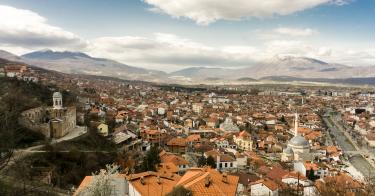Consider the World Bank’s allegedly nuanced ban on coal absolute now.
World Bank President Jim Yong Kim stated last week the organization has “made a very firm decision” to not extend partial risk guarantees for the construction of a new 500-megawatt coal power plant in Kosovo. This new coal plant is to replace the older of Kosovo’s two coal plants, considered by the World Bank to be Europe’s “worst single-point source of pollution.”
The World Bank’s stated policy is to help finance coal power projects “only in rare circumstances … such as meeting basic energy needs in countries with no feasible alternatives to coal and a lack of financing for coal power.”
If Kosovo doesn’t meet that criteria, it’s hard to imagine what would.
After a half-century under Cold War communism followed by civil war, Kosovo is slowly moving away from a centrally planned economy to free markets. Still, 10 percent of Kosovo’s gross domestic product comes from international aid, and it remains one of Europe’s poorest countries with unemployment at 30 percent.
A 2013 survey by the World Bank and the International Finance Corp. found that electricity was identified as a “main obstacle” in running a business. Imagine trying to run a grocery store or factory where extended and routine power outages could mean spoiled food or ruined machinery.
Affordable, reliable energy is essential to unlock economic growth and opportunity for people and for improving environmental health. Accordingly, coal is being used to supply 39 percent of the world’s heat and electricity.
A new, clean burning coal plant in Kosovo could do likewise to support growing industry with abundant domestic supply and provide reliable backup power to the 33 megawatts of new hydro and intermittent solar and wind capacity brought online in Kosovo since 2016.
Despite the energy security a new coal plant could provide, environmental extremists have argued Kosovo’s coal should stay in the ground and renewables should pick up the power-providing slack. But there are good reasons from an environmental and human health perspective to build a new coal plant
Not long ago, the World Bank said of building this new plant that “particulate matter emissions would be reduced by more than 90 percent, SOx and NOx by around 70 percent and [it would] be at least carbon neutral, if not carbon reducing.” In the U.S., North Dakota, which is one of the few states that meet the Environmental Protection Agency’s National Ambient Air Quality Standards, relies on seven power plants that run on lignite coal for much of its power.
Also, Germany, which has made itself out to be a global warming warrior with its costly Energiewende national strategy to phase out coal and nuclear plants, operates 47 coal plants compared to Kosovo’s two and contributes 2 percent of global carbon dioxide emissions, compared to Kosovo’s less a 10th of 1 percent. Germany also is the largest producer and consumer of lignite coal.
But it is Kosovo that gets a lecture from the World Bank on global warming.
To meet Kosovo’s immediate and long-term energy needs, practical solutions must be implemented. A modern coal plant would provide a clean source of affordable energy that is locally abundant, and it wouldn’t exclude other options, such as renewables, as Kosovo’s economy grows.
Even though the World Bank has strayed far from its roots to double down on a global warming agenda directly contrary to the needs of the countries it is allegedly trying to aid, Kosovo should not be discouraged from its efforts to do well by its people.
This piece originally appeared in The Daily Signal.



